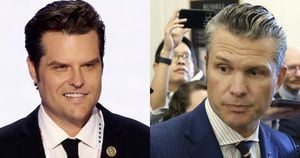After Donald Trump’s recent re-election, the airwaves are buzzing with reactions from various strata of society, reflecting a wide spectrum of support, skepticism, and outright opposition. Trump’s victory, albeit narrow, has sparked intense debate about what it means for the country and its future, igniting discussions not just among political pundits but also among everyday Americans, celebrities, and even world leaders.
The Republican leader touts his victory as indicative of a "mandate" from the people, claiming unparalleled strength and support. "It’s unprecedented!" he declared on election night, undoubtedly invigorated by the support he received. Yet, as the numbers roll in, the claims of sweeping victory seem increasingly exaggerated. Trump’s popular vote margin has significantly shrunk from what it appeared to be at the close of polls, drawing comparisons to previous winners like Barack Obama and George W. Bush who entered office with much larger mandates.
On closer inspection, Trump’s popular vote stands at around 49.87%, which raises questions about the legitimacy of his claims. Unlike Obama, who garnered victories with margins of nearly four percentage points, Trump’s win over Kamala Harris has dwindled down to just 1.62% – a figure smaller than Hillary Clinton’s margin over Trump back in 2016. Comparisons expose the fragility of his supposed mandate, as newspapers, political analysts, and voters alike grapple over these conflicting narratives.
Adding to the confusion is the almost paradoxical nature of Trump’s electoral success versus popular support. He may have secured 316 electoral votes, surpassing Biden’s performance and solidifying Republican control, but the close nature of his win left many voters polarized and entrenched. Crucial battleground states where he gained ground show slim margins, indicating discontent among nearly half the electorate.
Trump’s intense governing style, reminiscent of commanding authority, has raised eyebrows. Should his administration adopt aggressive measures mirroring conflict management strategies from U.S. Civil War history to attain unity, it might spell trouble. His reliance on advisors with overt disdain for federal agencies may hinder cooperative governance. Former officials and critics are concerned about potential conflicts arising from appointments and governance approaches, summarizing it as reminiscent of ruling over "a devastated and occupied enemy territory" rather than serving the nation as President. Such sentiments reflect apprehension about how Trump will wield power with such evident discord among the populace.
Meanwhile, among the celebrity crowd, reactions ranged from supportive to humorous, with many utilizing their platforms to express concerns over what Trump’s term means for the arts, civil rights, climate change, and inclusivity. Celebrities like Bruce Springsteen and Robert De Niro, known for their vocal opposition to Trump, have had their names circulated through rumors of exiting the U.S. due to the election result, often embellished on social media.
Speculation sparked by pages like The Patriots Network suggested both stars had proclaimed intentions to leave, which was later debunked as satire. De Niro, who had previously expressed his frustration with Trump’s presidency, was drawn back to old dialogues. It posed the question: how many entertainers would genuinely abandon their home nation due to political strife?
Still, what drew more attention was the idea of Elon Musk’s involvement following Trump’s victory. Reports indicated Musk was not just celebrating but finding ways to integrate himself within the new political framework. His communication with Trump included calls with Google’s Sundar Pichai, demonstrating Musk’s growing influence and possible role as Trump’s ally within Silicon Valley. His transition from tech mogul to political player marks significant shifts within corporate America’s alignment with political figures.
Trump’s communications approach, often fraught with the rhetoric of bias, found its way back to the limelight. He grilled Pichai about Google’s news portrayal, probably seeing it as not favorable, to say the least, implying he ought to receive positive press coverage commensurate with his knockout performance. "Google doesn’t represent my stories," Trump said, positioning himself as the outsider rallying against mainstream media giants.
The political atmosphere post-election evokes mixed sentiments, where some perceive each unsatisfactory headline as another reason to promote unity; others see discord as validation for opposition. It raises questions about how both the national psyche and cultural response shape the democratic process. If celebrities leave, will they facilitate movements or spark debates? If Trump reinforces tribal power dynamics, will it unite or divide?
Questions of electoral integrity and the realness of mandates will continue to be dissected as the incoming administration prepares for governance. Some aides remained aware of the precarious balance Trump must navigate, surrounded by enthusiastic supporters, yet facing significant opposition. His ambitious plans for the country carry the shadows of division and skepticism—both points of view need examining. From establishments to the streets, the narrative remains complex and the atmosphere rife with anticipation for what may come next.
Political analysts predict dangerous precedent-setting may emerge should Trump’s approach continue unabated. Instead of establishing bipartisan cooperation, the agenda could lean heavily toward those who fall under his direct influence. Consequently, the electorate remains on the edge, anticipating whether the current president can steer America through this tumultuous period with all voices heard or risk marginalizing dissenting opinions.
The political theater of Trump's presidency rolls on, drawing myriad reactions from all walks of life—from newspaper columns to social media feeds—which will be instrumental as the 2024 term trickles on. The realities awaiting the nation will undoubtedly be shaped by every spoken word and every electoral move made by those currently steering the political boat.



